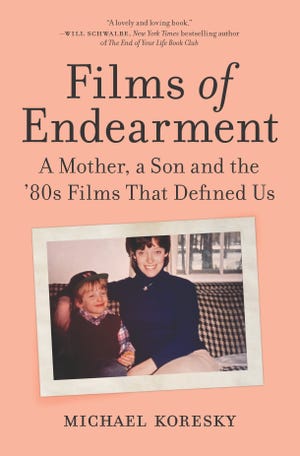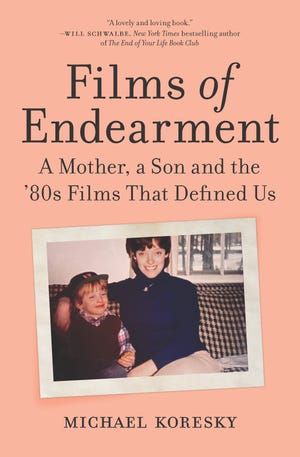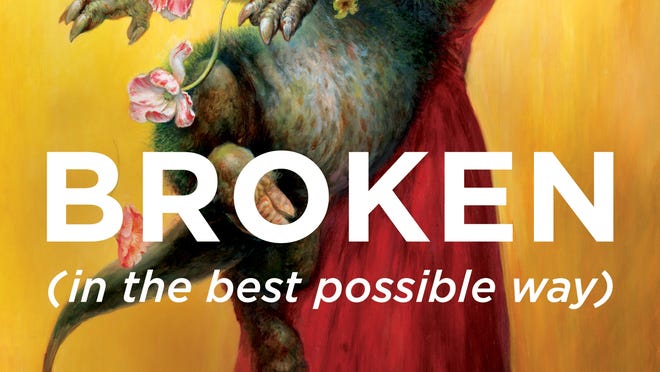
“What are the hidden parts of the self that a movie can lay bare?”
That question forms the premise of Michael Koresky’s new book, “Films of Endearment: A Mother, a Son and the ’80s Films That Defined Us” (Hanover Square Press, 288 pp., ★★★1/2 out of four), a memoir-in-movies that examines the author’s life through some of the films that have meant the most to him.
For Koresky, as for any devout film lover, movies are more than just pleasant diversions. The best ones are cherished totems almost spiritual in import. For Koresky, that is in no small part thanks to his mother, Leslie, an avid filmgoer who passed her love of cinema to her son, a filmmaker, writer and editor for The Criterion Collection, Film at Lincoln Center and other publications. Film isn’t just entertainment, it’s a birthright.

In considering his inheritance, Koresky alighted on a clever personal project that formed the book’s foundation: Over the course of months, he and Leslie would revisit an ’80s movie together, one for each year of the decade in which Koresky was an impressionable child. The films they chose run the gamut of genre and tone. There’s 1980’s topical comedy “9 to 5,” 1983’s best-picture-winning family drama “Terms of Endearment,” James Cameron’s 1986 sci-fi action blockbuster “Aliens” and the beloved 1988 Jewish rom-com “Crossing Delancey.”
‘9 to 5’ turns 40:The feel-good 1980 comedy covers a depressing reality even in 2020
According to the rules Koresky established for his projects, the wildly different films do share some DNA: They’re all films with special significance to Koresky and his mother, and they all place women characters front and center.
Such films spoke especially to Koresky growing up, a gay boy who then did not yet know it. He eschewed many of the more macho hits of the ’80s for films that centered the lives of women – for instance, Robert Altman’s small and peculiar play adaptation “Come Back to the 5 & Dime, Jimmy Dean, Jimmy Dean,” about a group of women in a dusty Texas town who bond over a shared reverence of actor James Dean.
The film is notable for its depiction of a transgender woman, Joanne (played by Karen Black), one of the first of very few multidimensional and empathetic portrayals of a trans character in cinema. Koresky, gay and happily married with a husband, reflects on depictions (or lack thereof) of queerness in film, while mother and son discuss his coming-out as the credits roll on their rewatch. “We knew before you did,” she tells him.
Review:Andy Weir’s ‘Project Hail Mary’ is an out-of-this-world tale of science and friendship
“Movies taught us both to look at the world with a humane curiosity,” Koresky writes, and so their film project naturally encourages more introspection, conversation and personal revelation. Their viewing of the 1987 comedy “Baby Boom,” starring Diane Keaton as a devoted career woman who overnight finds herself a mother struggling to juggle the two worlds, gives Koresky insight into his mother’s own domestic life when the film moves her to tears. “I liked being home with you kids. I liked our house. I liked our life.” He’s struck by her use of the past tense.

Their film project eventually hits a wall: the COVID-19 pandemic. Moved by the loving cultural depictions of Jewishness in “Crossing Delancey,” Leslie offers to host the family’s next seder. Koresky luxuriates in the warm memory of seders past – only for the pandemic to disrupt their plans. And their next film viewing.
Koresky, a writer accustomed to turning his critical eye outward, professes discomfort at turning it inward to write about himself. That discomfort doesn’t show in Koresky’s tender depiction of a loving mother-son relationship and the passion for film it fostered. Koresky’s film writing is incisive and confidant but always approachable, never so academic that it loses its heart.
For all its specificity to Koresky’s lived experience as a gay, Jewish working-class kid coming of age in the New England suburbs, “Films of Endearment” moves with a beautiful universality that will inspire readers not only to revisit the ’80s films of the book, but to set out on film journeys of their own.
More:‘Are you man enough to be a princess?’: Channing Tatum certainly is with new kid’s book ‘Sparkella’
